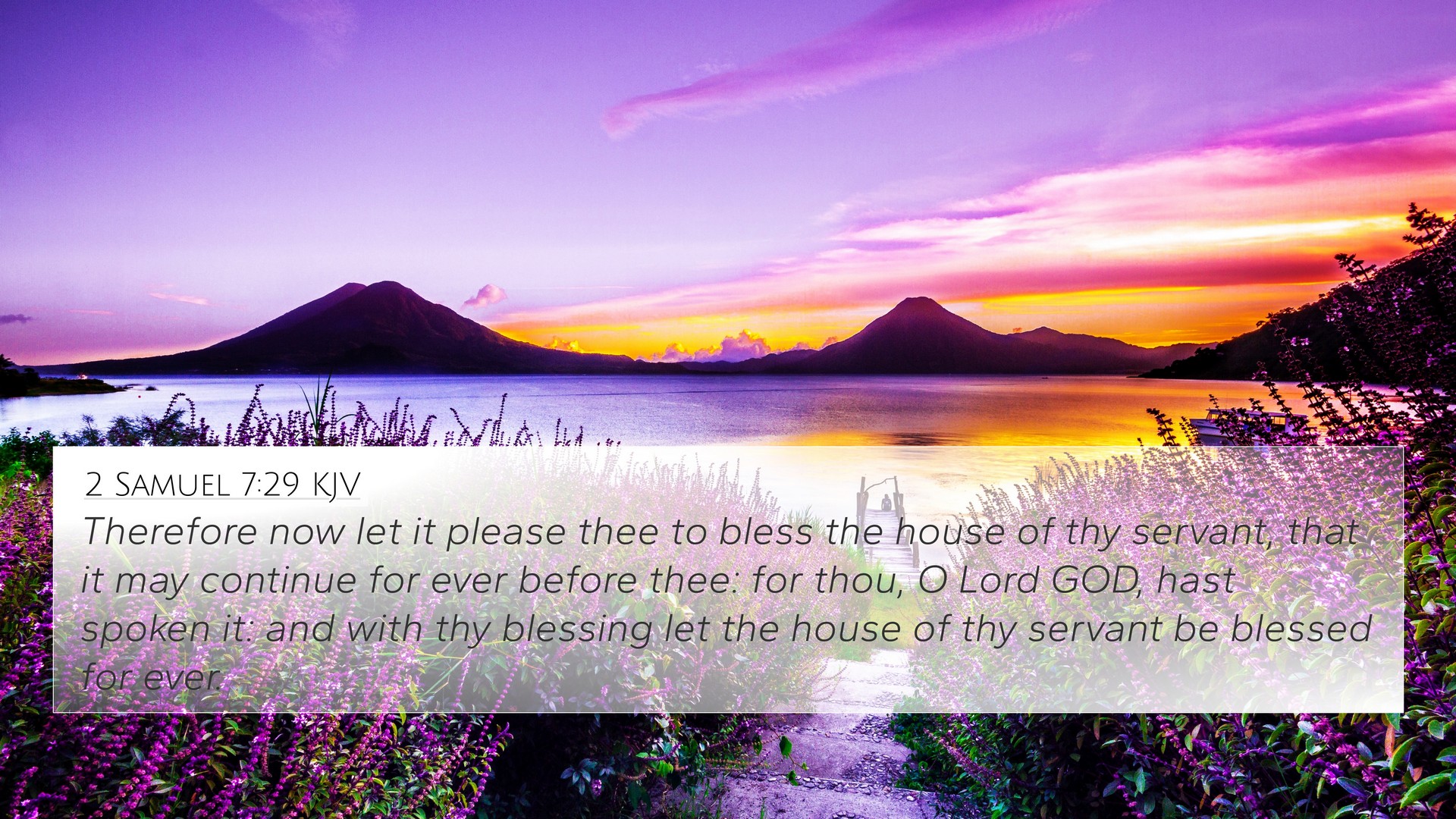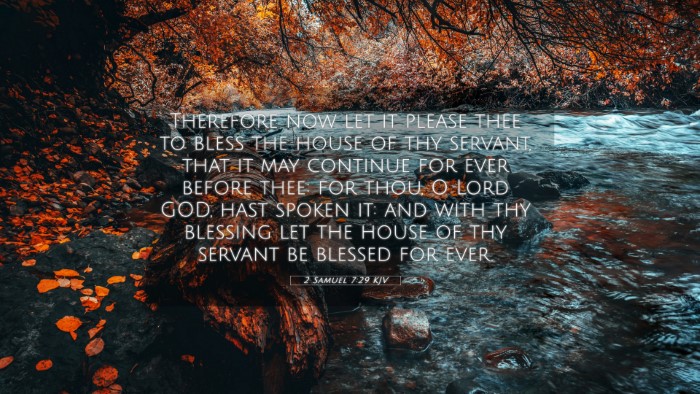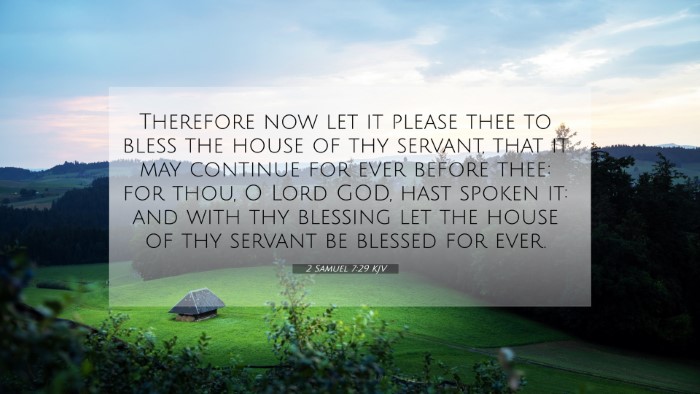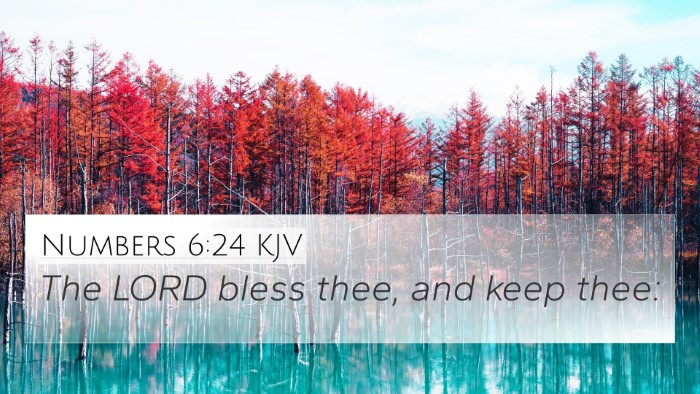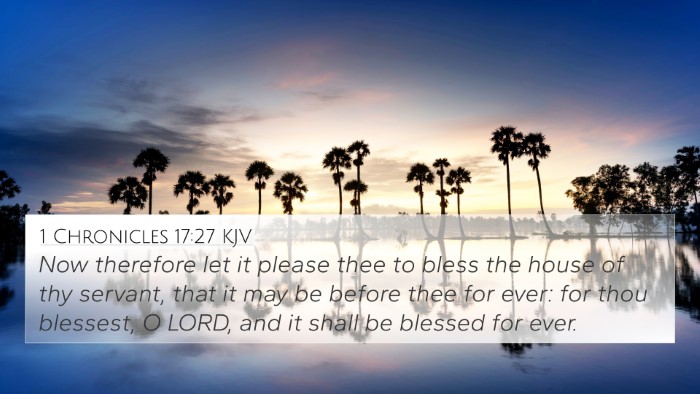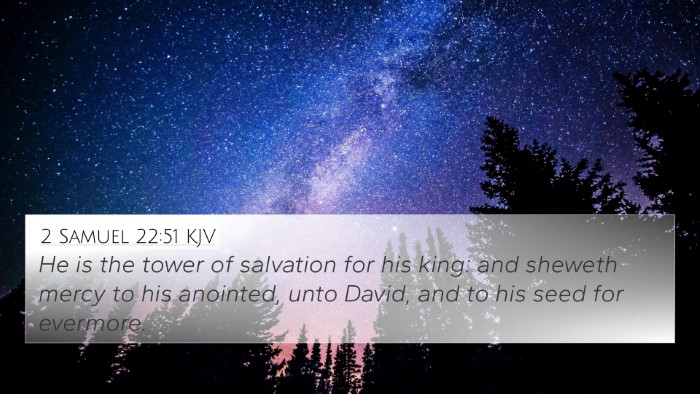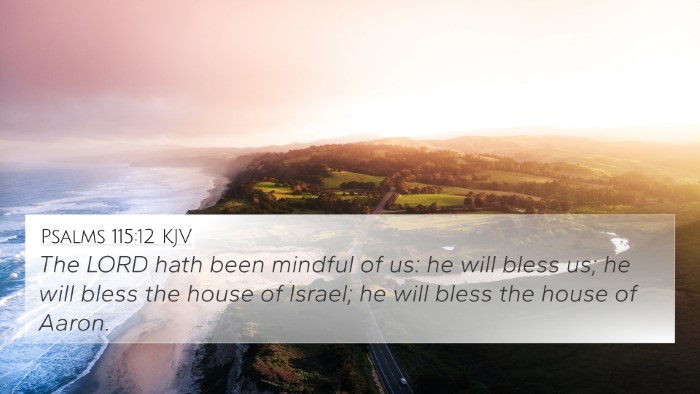Understanding 2 Samuel 7:29
Bible Verse: 2 Samuel 7:29: "And now let the word that you have spoken concerning your servant and concerning his house be established forever, and do as you have spoken."
Summary of the Verse
This verse captures a moment of profound prayer where King David appeals to God to fulfill His promises concerning David’s lineage. It emphasizes the hope and assurance of divine commitment to establish a lasting covenant with the house of David. This covenant belief forms a strong underpinning in the narrative arc of the biblical history concerning God's people.
Insights from Public Domain Commentaries
Matthew Henry's Commentary
Matthew Henry notes that this verse reflects David's earnest desire for stability and permanence in God's promises. David recognizes that the blessings bestowed upon him and his house are by God's grace. Henry emphasizes that the divine promises are to be held with faith and should inspire confidence, knowing that God's word will not fail.
Albert Barnes' Notes on the Bible
Albert Barnes interprets this verse as a reaffirmation of God’s fidelity to His promises. Barnes connects this verse with God's earlier promises to Abraham and his descendants, underscoring a broader theological theme of God’s unchanging nature and His faithfulness through generations. The petition implies a sense of urgency and desire on the part of David for God’s will to be accomplished without delay.
Adam Clarke's Commentary
In Adam Clarke's analysis, he focuses on the significance of the 'word' mentioned in the verse. Clarke argues that this "word" denotes God’s eternal purpose and plan for redemption through David’s house. He explains that this desire for establishment points to the messianic implications, linking the verse to future New Testament realities concerning Christ, who is referred to as the 'Son of David.'
Connections to Other Bible Verses
2 Samuel 7:29 resonates with numerous other scriptures that enhance the understanding of God’s promises and covenant theology:
- 2 Samuel 7:16 - “And your house and your kingdom shall be established forever before you.” This is the foundational promise related to David’s legacy.
- Psalm 89:3-4 - “I have made a covenant with my chosen, I have sworn to David my servant: ‘I will establish your offspring forever.’” This passage echoes God’s eternal promise.
- Isaiah 9:7 - “Of the increase of his government and of peace there will be no end, on the throne of David and over his kingdom.” Here, the prophecy speaks of the everlasting nature of David’s lineage.
- Jeremiah 33:17-18 - These verses assure that David will not lack a descendant to sit on the throne, reinforcing the direct lineage and God’s commitment.
- Luke 1:32-33 - The Angel Gabriel’s message to Mary underscores the fulfillment of God’s promise, relating to the house of David through Jesus.
- Acts 2:30-31 - Peter’s sermon refers back to David's promises and emphasizes their fulfillment in the resurrection of Christ.
- Romans 1:3 - Paul speaks of the Gospel concerning Jesus, who was descended from David according to the flesh, linking New Testament teachings to this Old Testament promise.
Thematic Connections and Interpretations
This verse is steeped in themes of covenant, divine faithfulness, and the continuity of God’s promises throughout scripture. The interconnectedness of 2 Samuel 7:29 with the verses noted above reflects several important theological perspectives:
- Covenantal Theology: The understanding of God’s covenants with His people is central to both the Old and New Testaments.
- Messianic Promise: The anticipation of a Messiah from David’s lineage is a crucial theme that echoes through scriptural history, linking the promises given to David with their ultimate fulfillment in Jesus Christ.
- Faith in God’s Promises: Just as David appeals to God to act on His promises, believers today are encouraged to trust in God’s faithfulness despite changing circumstances.
Conclusion
2 Samuel 7:29 stands as a testament to the steadfastness of God’s promises. Engaging with this verse through the lenses of commentary insights and cross-references enriches our understanding of its implications and the nature of divine assurance. The verse not only reassures of God’s covenant with David but also serves as a reminder of the broader narrative concerning God’s plan for redemption as we discover connections between Bible verses that relate deeply to one another.
Further Study and Tools
For those interested in deeper exploration of scripture, utilizing tools such as a Bible concordance, Bible cross-reference guide, and resources on cross-referencing Bible study methods can greatly enhance one’s ability to uncover thematic Bible verse connections. Approaches to understanding scripture in the context of inter-Biblical dialogue help illuminate the profound connections between Old and New Testaments.
